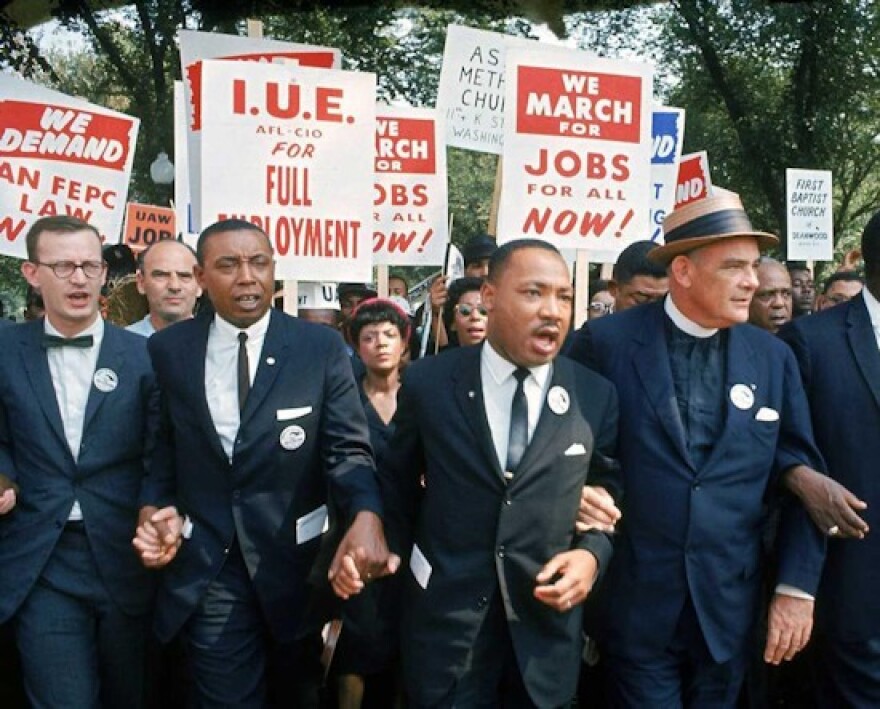Our nation honors the life, legacy, and dreams of Dr. Martin Luther King, Jr. Believe it or not, he devoted a large amount of his life to supporting unions.
No doubt, King is best known for helping lead the fight against racial segregation or Jim Crow. While deeply important, the Civil Rights Act and Voting Rights Act did not end the struggle for equality.
Perhaps surprisingly, ending legal discrimination based upon race proved the easy part, for Jim Crow was so obviously unethical and unconstitutional.
Much harder, alas, has been eradicating poverty, another of King’s primary objectives and inextricably linked to racial equality. As a Christian, King considered it immoral that, in a nation as rich as ours, there should be any poor people. As an American, he challenged all of us to live up to the ideal of equality of opportunity.
He famously asked, "What good does it do to be able to eat at a lunch counter if you can't buy a hamburger”? Indeed.
In order to uplift the poor, King encouraged all workers to join unions. He called them the first and greatest anti-poverty program.
Why? Well, when workers are stronger, they are able to bargain for higher salaries, safer workplaces, paid parental and eldercare leave, health insurance, pensions, and the like. The evidence is undeniable: workers in unions get paid much more and have more power. That’s also why employers dislike them.
King literally died while fighting for a union, murdered in Memphis in 1968 while helping that city’s sanitation workers, a majority of whom were black, to organize a union. The city’s elected officials were both racist and anti-union.
The correlation between higher union membership and a larger middle class is quite strong. Just look at US History: when union membership was largest, in the 1950s, the US middle class was at its largest and economic inequality lowest. Similarly, I would suggest the single-most important reason that the middle class has declined during the past forty years has been the dramatic decline in union membership.
Where are unions still strong? The public sector. Why? For one reason, we can’t ship public schools and police departments to China.
I belong to the University Professionals of Illinois or UPI, perhaps the largest and most powerful union in western Illinois. We are the heart of this region’s middle class.
Right now, UPI is under attack.
Governor Bruce Rauner is cynically taking advantage of the Illinois state budget crisis to try to destroy public sector unions. He’s made this quite clear.
No doubt, WIU President Jack Thomas is in a tough situation. But he must know that—although our fiscal crisis is quite real—politicians caused it. In fact, we, government workers, contribute our share to the state pension system each and every paycheck. It was state governors and legislators who failed to uphold their responsibility.
If WIU administrators break the contract—and faith—with UPI, not only will nearly fifty professors and other workers be fired.
It is not inconceivable that many other professors will see their salaries cut and WIU move to more part time faculty. Across the USA, part-time, or adjunct, professors literally earn poverty wages. These actions would devastate the region’s economy. That is, an attack on WIU workers will hurt all of us.
There is no question where Dr. King would stand: with union faculty, just as he lived and died with union sanitation workers.
In 1961, King spoke before the AFL-CIO and described: “A dream of equality of opportunity, of privilege and property widely distributed; a dream of a land where men will not take necessities from the many to give luxuries to the few…”
While far less famous than his 1963 “I have a dream” speech, today—as we honor his legacy—I urge everyone to consider why Dr. King so strongly advocated for unionism.
Peter Cole is a Professor of US History at Western Illinois University.
The opinions expressed are not necessarily those of the University or Tri States Public Radio. Diverse viewpoints are welcome and encouraged.









